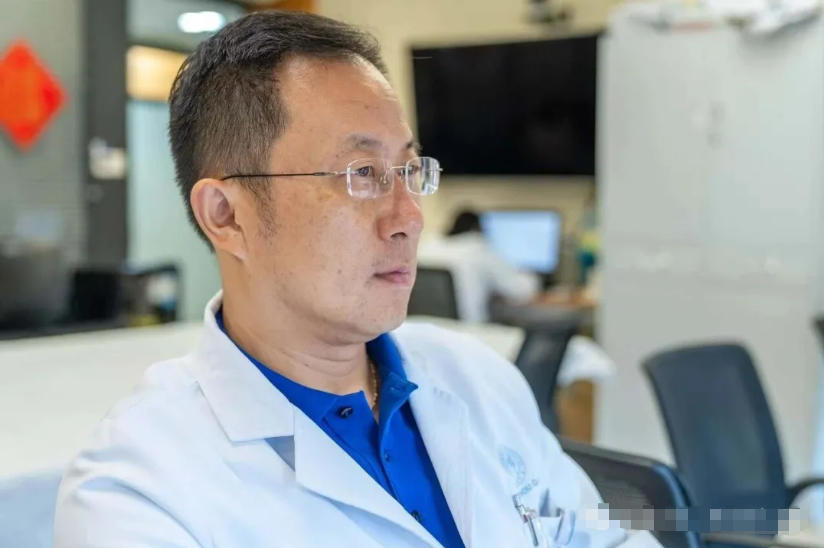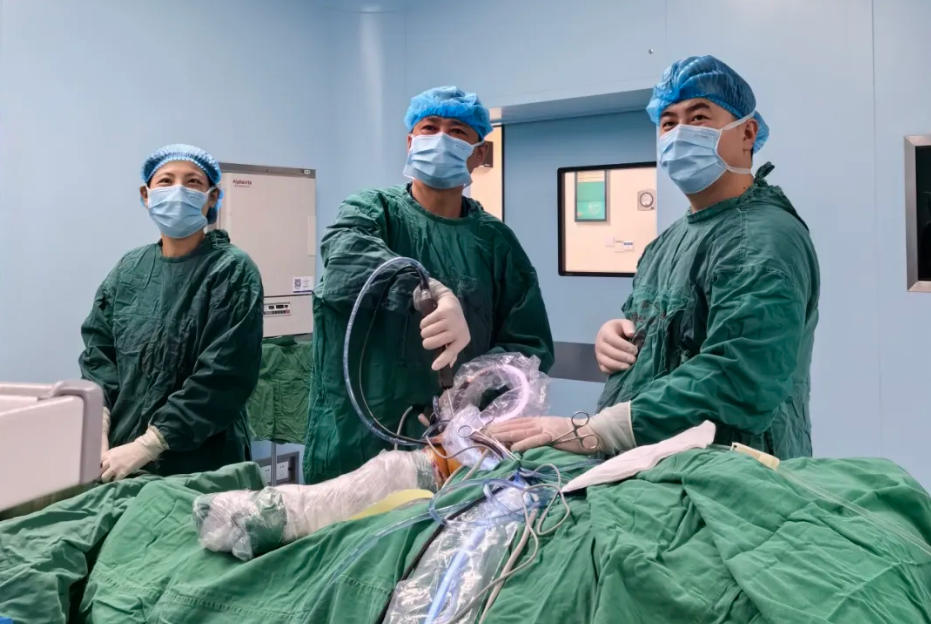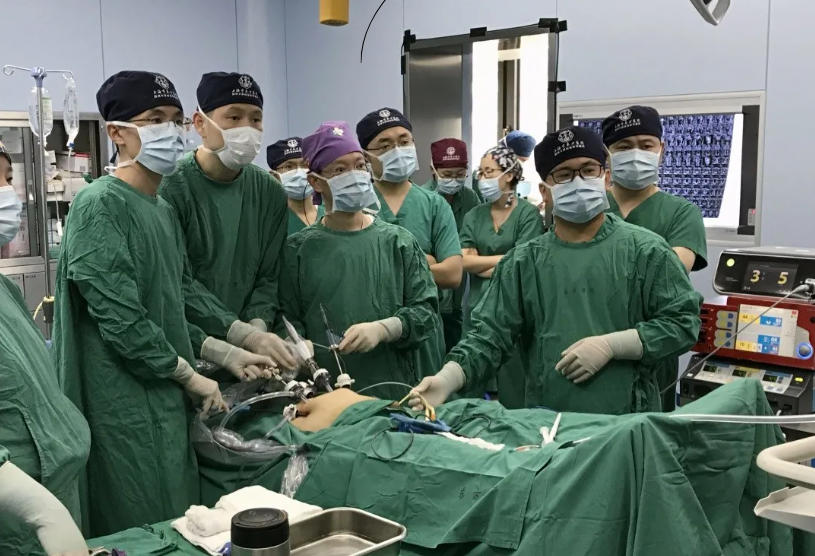Update time:2025-09-12Visits:3567

Ni Zhaohui, Professor of Nephrology, Former Director of the Department of Nephrology, Renji Hospital
Introduction
She is a passionate and candid physician.
She is also a renowned expert in nephrology, a visionary medical education reformer dedicated to innovation, and a leader with a global perspective. Under her guidance, the Department of Nephrology at Renji Hospital is advancing toward a brighter and broader future.
From the outset, she has firmly believed that integrating traditional Chinese medicine (TCM) and Western medicine holds the key to a new era in kidney disease treatment. Here, ancient TCM wisdom and modern Western techniques converge, creating therapeutic miracles.
She strives to enhance public awareness of kidney diseases through science popularization, empowering patients to manage their health and embrace fulfilling lives. She is convinced that relentless effort will cultivate more outstanding medical talent, strengthen team collaboration, and drive sustainable innovation in her department.
Looking ahead, she has a clear vision and ambitious blueprint. Her goal is to make safer, more accessible treatments available to more patients. Under her leadership, the Department of Nephrology at Renji Hospital is entering a transformative new era.
The Path to Medicine
“My youth unfolded in a tumultuous era. In 1977, the reinstatement of the national college entrance examination presented an unprecedented opportunity for young people. I was fortunate to be among the second cohort of students after this policy change.”
Choosing medicine was a natural decision for Ni Zhaohui. Her mother had suffered from chronic illness, and Ni witnessed firsthand the anguish disease inflicted on families. She still recalls the days spent accompanying her mother at Huashan Hospital. When her mother passed away at 18, Ni’s resolve to become a physician took root. She knew the path of medicine would be arduous, but once chosen, it demanded unwavering commitment.
Her perseverance paid off. Ni excelled in her studies and was admitted to Shanghai Second Medical College, a cradle of medical excellence.
“My years at Shanghai Second Medical College were focused yet fulfilling. I was deeply interested in clinical research rather than basic science, so I pursued a clinically oriented track. There, I encountered exceptional mentors and peers whose guidance and camaraderie fortified my medical journey.”
After five years of outstanding academic performance, Ni graduated and passed her internship assessments, securing a position at Renji Hospital to begin her career as a doctor.
“Renji Hospital is my home. Here, I grew from a resident physician to an attending, associate director, and ultimately director.”
In medicine, legacy is an invisible force that transmits the wisdom and experience of generations. Ni’s work in building Renji’s nephrology department was profoundly shaped by her predecessors.
“My mentor, Professor Zhang Qingyi, was a highly respected medical scientist with profound expertise in integrative East-West medicine. His excellence extended beyond clinical skills; his noble ethics and charisma deeply influenced me. When I began my career, he was already the department director and Party branch secretary. He treated everyone—patients and colleagues alike—with warmth and respect.”
Professor Zhang’s integrity and mastery inspired Ni. Under his guidance, she gained deeper insights into medical knowledge and learned to approach every patient with equanimity.
“Professor Zhang’s patience and meticulousness left an indelible mark. He tirelessly taught us to observe patients with precision and to integrate TCM and Western knowledge in treatment. In his clinic, I mastered fundamental techniques, and extensive prescription-copying honed my foundational skills—simple practices that became the bedrock of my future work.”
Professor Zhang not only guided Ni in clinical practice but also supported her academic research and career development. He encouraged her participation in integrative medicine conferences, broadening her horizons.
As the chairman of the Shanghai Association of Integrative Medicine, Professor Zhang later recommended Ni as his successor upon retirement. Though young, Ni received strong backing from him and other senior members of the association.
“I initially hesitated to take on a leadership role due to my youth and inexperience. But Professor Zhang assured me that senior colleagues would support me. With their encouragement, I accepted the responsibility, and the association flourished under my leadership.”
Landmarks in Integrative Medicine
From the 1980s to the 1990s, Ni Zhaohui achieved remarkable milestones in nephrology and integrative kidney disease treatment. Her work advanced academic understanding of renal pathologies and introduced innovative clinical strategies.
In academic research, Ni systematically investigated the pathogenesis and treatment of various kidney diseases. Her studies on hypertension in primary IgA nephropathy revealed key hemodynamic factors, providing a theoretical basis for clinical hypertension management. Additionally, her research on zinc metabolism in maintenance hemodialysis patients opened new perspectives on nutritional and metabolic regulation for dialysis recipients.
Ni’s contributions to integrative medicine were particularly groundbreaking. Collaborating with Professor Zhang Qingyi, she explored the therapeutic role of Huangqi (Astragalus membranaceus) in kidney disease. A traditional TCM herb, Huangqi is known for its immunomodulatory, anti-inflammatory, and antioxidant properties. Ni further advanced this research in partnership with Professor Mou Shan.
Through rigorous experiments, Ni discovered that Huangqi significantly modulates extracellular matrix secretion and β1-integrin mRNA expression in glomerular mesangial cells, providing scientific evidence for herbal therapy in kidney disease. These findings enriched the theoretical framework of integrative medicine and expanded clinical treatment options.

Advancing Integrative Medicine in the 2000s
After 2000, Ni’s research in integrative medicine expanded in scope and depth.
Under her leadership, Ni’s team conducted systematic studies on Huangqi’s effects on kidney disease. They demonstrated that Huangqi positively influences glomerular mesangial cells by reducing matrix secretion and regulating the synthesis and degradation of extracellular matrices, thereby exerting therapeutic effects.
Clinically, Ni and Professor Mou Shan translated these findings into practice through multiple trials. Their work validated the efficacy and safety of Huangqi and other herbs in treating chronic renal insufficiency and nephrotic syndrome, improving both outcomes and patients’ quality of life.
Post-2011, Ni continued to demonstrate exceptional expertise and influence. Her work deepened the understanding of kidney disease mechanisms and drove innovation in integrative treatment strategies.
Ni explored peritoneal dialysis (PD) for chronic kidney disease (CKD). Her team systematically evaluated PD’s clinical efficacy, confirming its effectiveness in toxin clearance and its role in preserving residual renal function. She also prioritized PD patients’ quality of life, optimizing protocols and education to boost satisfaction and treatment adherence.
Ni emphasized the critical link between kidney disease and cardiovascular complications. CKD patients often face cardiovascular risks that severely impact prognosis. She advocated integrating cardiovascular risk assessment into kidney disease management and promoted multidisciplinary care models to reduce cardiovascular events.
Her approach to personalized treatment was equally distinctive. Recognizing the uniqueness of each patient’s condition, she championed tailored therapies based on individual clinical profiles—a philosophy widely adopted in clinical practice to enhance treatment precision and safety.
New Insights into Complex Conditions
As a chief specialist at Renji Hospital, Ni Zhaohui and Professor Mou Shan accumulated invaluable expertise in treating severe kidney diseases like lupus nephritis (LN) and diabetic kidney disease (DKD). Their approach transcends symptomatic relief, focusing on long-term health and quality of life.
“Years at Renji taught me that physicians must treat the whole person, not just the disease. For lupus nephritis, I stress early diagnosis. Renal damage from systemic lupus erythematosus is often insidious yet severe; timely screening and intervention are vital for prognosis.”
Ni advocated simple but effective screening methods—urine albumin-to-creatinine ratio (UACR), urinalysis, and serum creatinine—to detect early renal changes. Individualized LN treatment plans consider both pathological classification and the patient’s systemic condition.
She understands that every patient’s journey is unique. Under her guidance, care extends beyond medication to lifestyle adjustments and psychological support.
“Treating LN is a marathon. Patients require long-term follow-up to monitor disease progression and treatment efficacy. I consistently advise avoiding nephrotoxic drugs and maintaining healthy habits to prevent relapses.”
For DKD, Ni similarly emphasizes early intervention and comprehensive management. Diabetic kidney damage often progresses silently but rapidly once initiated. Strict glycemic control, blood pressure management, lipid regulation, and lifestyle changes are crucial to delaying progression.
Ni’s insight into DKD lies in early detection and precise timing of interventions. When DKD advances to end-stage renal disease (ESRD), renal replacement therapy becomes a lifeline. She selects optimal treatments—dialysis modality and timing—based on renal function, overall health, and resource availability.
“For DKD patients, choosing the right dialysis approach and timing is life-critical. My team evaluates all factors to tailor the best plan. We also address comorbidities like cardiovascular disease, anemia, and infections through regular monitoring and preventive care.”
Ni’s work not only improved clinical outcomes but also elevated patients’ quality of life. She knows healing encompasses more than drugs and surgery—it embodies holistic care. Her practice exemplifies medical humanism and professional dedication.
Over four decades, Ni has made transformative contributions to nephrology, propelling Renji’s department to new heights. Her research has deepened the understanding of kidney diseases and pioneered novel clinical strategies, significantly reducing disease burdens and enhancing patient well-being.

Pioneering Medical Education Reform
Innovating medical education is key to shaping future physicians. At Renji Hospital, Ni Zhaohui is not just an outstanding clinician but a trailblazer in educational reform.
“Amid rapid medical advancements, I believe innovating educational models is essential. Introducing the ‘4+4’ medical education program aligns us with global elite institutions. This framework attracts multidisciplinary talent, nurturing physicians with deep medical knowledge and broad perspectives.”
As director of the nephrology residency program, Ni maintains rigorous standards for trainees. She views standardized residency training as the cornerstone of clinical skill development.
“Our residency program integrates theory and practice, ensuring physicians grow through hands-on experience. Strict training and assessments enhance clinical reasoning and technical skills, supplying high-caliber talent to the medical workforce.”
Ni champions integrative medicine in CKD prevention and treatment, cultivating bilingual (TCM/Western) professionals. She emphasizes this in curricula through dedicated courses and clinical practice, enabling students to master integrative diagnostics and therapeutics.
Her curriculum reforms keep pace with medical frontiers. “Medicine evolves constantly, so education must too. I’ve incorporated cutting-edge topics like biologic therapies and advances in glomerular disease research to expose students to the latest knowledge.”
Ni prioritizes experiential learning, believing firsthand experience reveals medicine’s complexities. She encourages participation in simulated case discussions, clinical rotations, and research projects to foster critical thinking and scientific inquiry.
To optimize resources, Ni established international exchange platforms and leveraged digital tools to strengthen faculty development.
“Global collaboration elevates medical education. We partner with leading institutions worldwide, offering students broader perspectives. Digital resources also provide flexible, accessible learning tools.”
These innovations have yielded significant results, nurturing top-tier talent and advancing medical education. Ni takes pride in her students’ successes—their achievements affirm her work.
Looking forward, Ni envisions expanding her impact beyond clinical care to education, research, and public health policy.
“Our future goals are multifaceted. First, we aim to promote home hemodialysis, enabling safer, more convenient treatment and improved quality of life. Second, we will deepen integrative medicine research to discover novel therapies for comprehensive kidney disease care.”
Ni also seeks global collaboration, inviting international experts to introduce new concepts and technologies, elevating China’s nephrology standards to align with global best practices.
“Science popularization remains a priority. I aim to boost public awareness of kidney diseases, empowering patients to manage their health proactively and prevent disease progression.”
With unwavering dedication, Ni Zhaohui strives to enhance patient lives, advance medical education and research, and contribute to Renji Hospital’s legacy. She believes the future of medicine is bright—and patients will thrive in it.
Editor: Chen Qing @ ShanghaiDoctor.cn
If you'd like to contact Doctor Ni, please be free to let us know at chenqing@ShanghaiDoctor.cn.
Note: Chinese Sources from “The Path of Benevolent Medicine” which was published in 2024. It records 90 important medical figures in the history of Renji Hospital. Yewen Renyi (ShanghaiDoctor.cn) team was one of the major writers of the book and is authorized by Renji hospital to create English version on the website of ShanghaiDoctor.cn
Hospital: Renji Hospital, Shanghai Jiao Tong University School of Medicine
Dr. Zhou Qianjun | “Sculpting Life in the Chest” – A Portrait” – A Portrait
Dr. Cai Junfeng | Guarding Bone and Joint Health, Improving Quality of Life
Dr. Xu Xiaosheng|The Gentle Resilience of a Male Gynecologist
Dr. Shi Hongyu | A Cardiologist with Precision and Compassion
Dr. Zhang Guiyun|The Inspiring Path of a Lifesaving Physician
Dr. Chen Bin | Building the Future of ENT Surgery at Lingang,Shanghai
Prof. Zhang Baigen | The Oral History of China’s Vascular Surgery

Dr. Zhou Qianjun | “Sculpting Life in the Chest” – A Portrait” – A Portrait

Dr. Cai Junfeng | Guarding Bone and Joint Health, Improving Quality of Life

Dr. Cui Xingang | The Medical Dream of a Shanghai Urologist

Dr. Xu Xiaosheng|The Gentle Resilience of a Male Gynecologist

Dr. Shi Hongyu | A Cardiologist with Precision and Compassion

Dr. Zhang Guiyun|The Inspiring Path of a Lifesaving Physician

Dr. Jiang Hong | Bringing Hope to Vascular Frontiers

Dr. Huang Jia | A Journey of Healing "Breath"

Dr. Chen Bin | Building the Future of ENT Surgery at Lingang,Shanghai

Prof. Zhang Baigen | The Oral History of China’s Vascular Surgery